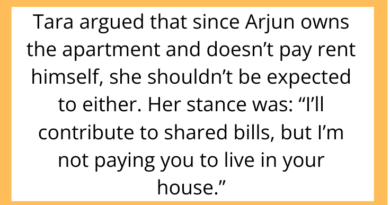AITAH for Not Letting My Girlfriend Move In Because She Doesn’t Pay Rent?
Relationships often get tested when love meets logistics—and few topics stir up more drama than money and living arrangements. In this AITAH-inspired story, one man’s refusal to let his girlfriend move in without contributing financially has people asking: Is he setting fair boundaries, or just being controlling?
Let’s unpack the conflict.
The Backstory: Living Together, But at What Cost?

A 28-year-old man—let’s call him Rohan—turned to Reddit’s r/AITAH community for advice. He owns a two-bedroom apartment in a major city. It’s fully paid off, inherited from his late grandfather, and he’s been living there alone for a few years.
His girlfriend of 10 months, Sana (26), recently brought up the idea of moving in. Rohan wasn’t opposed—he loves her and sees a future with her—but he had one condition: she’d need to pay a portion of the monthly expenses, including utilities and a “contribution” toward upkeep and shared costs.
Sana was stunned.
She argued that since Rohan owned the place and didn’t pay rent, it wasn’t fair to ask her to “subsidize” him. She believed that sharing space as a couple should be about building a life together, not about keeping score.
But Rohan saw it differently.
The Disagreement: Fairness vs. Financial Independence

Rohan explained that while he doesn’t pay rent or a mortgage, he still covers maintenance, property taxes, repairs, and utilities—all by himself. He wasn’t asking Sana to pay half the market rent, but a modest amount to help with shared costs and maintain fairness.
He added that living together isn’t just about love—it’s also about respect and shared responsibility. To him, footing all the bills while she contributed nothing felt more like parent-child dynamics than a partnership.
That’s when things blew up.
Sana accused Rohan of being transactional and inconsiderate. She said if she were in his position, she wouldn’t charge him anything. She even threatened to reconsider their relationship altogether.
Rohan asked Reddit: AITAH for expecting my girlfriend to contribute financially before moving in?
The Internet Reacts: A Relationship or a Roommate Agreement?

The AITAH subreddit didn’t hold back, and commenters were split—though many leaned toward Rohan.
In Support of Rohan:
-
“It’s about fairness, not rent.” One top comment said, “Just because you don’t pay rent doesn’t mean your expenses vanish. Asking her to contribute is reasonable.”
-
“Living together isn’t free.” Others pointed out that utilities, groceries, and wear-and-tear increase with an extra person in the house. Contributions help balance that.
-
“Protect your financial boundaries.” Several users praised Rohan for setting boundaries early and avoiding cohabitation resentment.
In Support of Sana:
-
“She’s not a tenant.” Some felt that asking for payment makes the relationship feel like a business deal.
-
“No mortgage = no rent.” A few commenters argued that if there’s no rent being paid by Rohan, then expecting Sana to pay a portion of “imaginary rent” feels exploitative.
-
“This should be about love, not money.” Critics of Rohan said that introducing money too early can poison the emotional foundation of a relationship.
The Real Issue: Values, Communication, and Expectations

This story isn’t just about money—it’s about how couples navigate shared responsibility and financial values.
Rohan’s Perspective:
-
Wants fairness and contribution, not dependency.
-
Fears financial resentment if he pays for everything.
-
Believes long-term success involves shared effort.
Sana’s Perspective:
-
Views the home as “already paid for,” so her paying anything feels exploitative.
-
Believes that love shouldn’t come with a price tag.
-
Feels the request signals distrust or a lack of generosity.
Both viewpoints are valid—but wildly different. The true clash here is over expectations, assumptions, and how each person defines what it means to “build a life together.”
Cohabitation Tips: How to Avoid These Conflicts

1. Have the Money Talk Early
Before living together, discuss expectations openly. Will you split expenses 50/50? Based on income? Will one partner cover more because they earn more?
2. Put It in Writing (Yes, Really)
Even if it feels awkward, putting cohabitation agreements in writing can save both parties from misunderstanding or resentment.
3. Balance Generosity With Boundaries
It’s okay to be generous in love—but boundaries are equally important. Both people should feel they’re contributing meaningfully to the household.
4. Avoid Assumptions
Never assume that your partner sees things the same way you do—especially when it comes to money.
The Verdict: Not the Villain—But Room for Better Communication

Rohan is not the villain for asking for financial contribution. He’s setting expectations in a respectful, transparent way. But relationships aren’t just logic—they’re emotional, too.
Could he have approached the conversation with more empathy? Possibly. Could Sana have asked more questions before reacting emotionally? Definitely.
They both have work to do—together.



